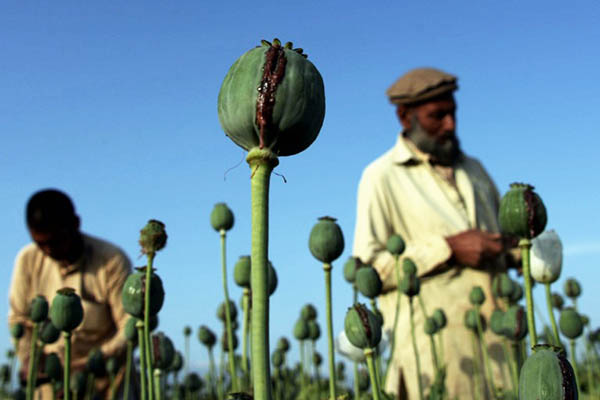
Noorullah Shirzada—AFP
Poor relations between Islamabad and Kabul make fruit crops an unviable alternative for Afghan farmers.
Frosty relations between Kabul and Islamabad have put a brake on Afghanistan’s ambitious plans to boost fruit exports, seen as vital to providing farmers an alternative to poppy cultivation which fuels the Taliban insurgency.
Pomegranates and grapes have long been the pride of Afghan agriculture, but exports from the landlocked country have suffered due to poor air connectivity and frequent border closures by the country’s neighbor Pakistan.
The sight of hundreds of long-haul trucks stuck along border towns became all too common in 2016, with tons of fruits and perishable items going to waste and forcing some farmers to return to the more lucrative cultivation of poppy. “We invested huge sums of money on growing fresh fruits in our orchards,” said grape farmer Abdul Samad from Panjwai district in southern Kandahar. “We are very frustrated that Pakistan frequently shut the border during harvest season. We have no choice but to return to poppy farming. It will fetch us a lot more money than fruits.”
Pakistan sporadically shut the main border crossings as tensions flared due to firing incidents between the troops of both nations. Pakistan announced last June it was planning more checkposts and fencing along the 2,600-kilometer frontier to filter the flow of militants. The move prompted consternation from Afghanistan, which does not officially recognize the so-called Durand Line as the international border.
In 2015 around 52,000 tons of pomegranates were exported to Pakistan, the U.A.E. and India. Last year the exports dropped to 15,000 tons, a small fraction of the total production. Other fruit exports also suffered.
“We were ready and hoping to export up to 40,000 tons of grapes from Kandahar, but Pakistan closed the gate for 17 days [in October], not allowing our traders to export their produce,” said Nasrullah Zaheer, head of the Afghan chamber of commerce in Kandahar. Agriculture Minister Assadullah Zamir accused Pakistan of using border security as a pretext to sabotage Afghan exports and shield its own farmers from competition.
“This is not the first time that border closures have happened. We had exactly the same issue in 2015 during harvest time,” he said, without stating the estimated monetary losses. “But we are here to support our farmers and the government is willing to cover a part of alternate transportation costs such as air cargo,” he added.
New Delhi recently announced it would launch an air-cargo link between Afghanistan and India that will help it bypass its border issues and open new markets for traders. The plans, however, remain at initial stages, frustrating farmers.
For years, Afghanistan has tried to give farmers alternatives such as fruit crops and saffron to wean them away from poppy farming—the lifeblood of the Taliban insurgency. But those efforts are failing and opium remains an economic linchpin for many Afghans.
Farmers need not bother with exports as a sprawling network of drug smugglers picks up opium produce directly from their farms, offering lucrative prices that normally far exceed the income from traditional agriculture. In 2016, Afghanistan saw a 10 percent jump in opium cultivation compared to the previous year because of bumper harvests, collapsing eradication efforts and declining international aid to combat drugs.
“Even if the government arrests us we are determined to grow poppy,” said Kandahar farmer Abdul Shukoor. “Pakistan closes the border randomly and our government is doing nothing.”
